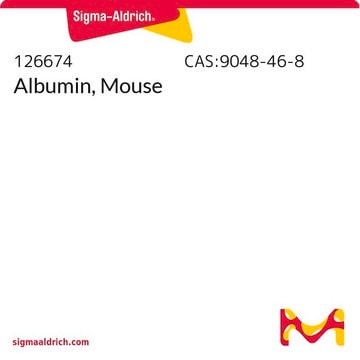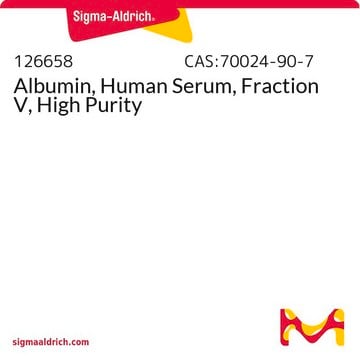A3559
Albumin from mouse serum
lyophilized powder, essentially globulin free, ≥99% (agarose gel electrophoresis)
Synonym(s):
Mouse albumin
Sign Into View Organizational & Contract Pricing
All Photos(1)
About This Item
Recommended Products
biological source
mouse
Quality Level
Assay
≥99% (agarose gel electrophoresis)
form
lyophilized powder
technique(s)
immunohistochemistry: suitable
UniProt accession no.
storage temp.
2-8°C
Gene Information
mouse ... ALB(11657)
Looking for similar products? Visit Product Comparison Guide
General description
Albumin, present in the blood, is the most abundant protein. Structurally, albumin comprises three homologous domains (DI, DII, and DIII) with 67% α-helices.
Application
Albumin from mouse serum has been used:
- as a standard in the enzyme-linked immunosorbent assay (ELISA) with urine samples
- in the preparation of isolevuglandin (IsoLG)-albumin adducts for immunohistochemical staining of human tissue samples
- for comparative studies with thymic stromal lymphopoietin (TSLP) to test its effect on dermal thickness in mice
Biochem/physiol Actions
Albumin transports fatty acids, drugs, and hormones. Mouse serum albumin (MSA) binds to the neonatal Fc receptor (FcRn).
Preparation Note
Prepared from albumin (A3139).
Other Notes
Albumin from mouse serum is free of globulin. It is derived from Swiss Webster strain mouse serum by cold alcohol fractionation. There are no heating steps involved in the preparation of this product.
This Fraction V albumin can be used for making immune complexes with anti-albumin antibodies. Fatty acids will not interfere with the complex formation.
This Fraction V albumin can be used for making immune complexes with anti-albumin antibodies. Fatty acids will not interfere with the complex formation.
Storage Class Code
11 - Combustible Solids
WGK
WGK 3
Flash Point(F)
Not applicable
Flash Point(C)
Not applicable
Personal Protective Equipment
dust mask type N95 (US), Eyeshields, Gloves
Certificates of Analysis (COA)
Search for Certificates of Analysis (COA) by entering the products Lot/Batch Number. Lot and Batch Numbers can be found on a product’s label following the words ‘Lot’ or ‘Batch’.
Already Own This Product?
Find documentation for the products that you have recently purchased in the Document Library.
Customers Also Viewed
Jeannette Nilsen et al.
Scientific reports, 8(1), 14648-14648 (2018-10-04)
Albumin has a serum half-life of three weeks in humans and is utilized to extend the serum persistence of drugs that are genetically fused or conjugated directly to albumin or albumin-binding molecules. Responsible for the long half-life is FcRn that
Steven A Jacobs et al.
Protein engineering, design & selection : PEDS, 28(10), 385-393 (2015-08-16)
A number of classes of proteins have been engineered for high stability using consensus sequence design methods. Here we describe the engineering of a novel albumin binding domain (ABD) three-helix bundle protein. The resulting engineered ABD molecule, called ABDCon, is
Optimizing the synthesis of interleukin-12-loaded PLGA nanospheres (rmIL-12ns) via ultrasonication for treatment of metastatic osteosarcoma.
Lacinski, et al.
Journal of Orthopaedic Research : Official Publication of the Orthopaedic Research Society, 41, 1565-1581 (2023)
Tamara K Nowling et al.
PloS one, 15(3), e0230499-e0230499 (2020-03-19)
Glycosphingolipids (GSLs) hexosylceramides and lactosylceramides are elevated in lupus mice and human patients with nephritis. Whereas other renal diseases characterized by increased GSL levels are thought to be a result of upregulated GSL synthesis, our results suggest elevated hexosylceramides and
Jung U Shin et al.
The Journal of investigative dermatology, 136(2), 507-515 (2016-01-30)
Recently, thymic stromal lymphopoietin (TSLP), which is well studied in allergic diseases, has been reported in fibrotic diseases, including idiopathic pulmonary fibrosis and atopic dermatitis fibrosis. However, the role of TSLP in keloid is obscure. In this study, we assessed
Our team of scientists has experience in all areas of research including Life Science, Material Science, Chemical Synthesis, Chromatography, Analytical and many others.
Contact Technical Service








